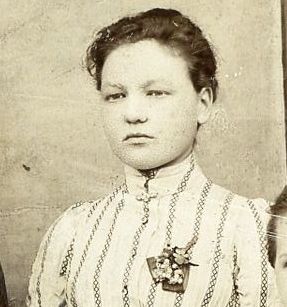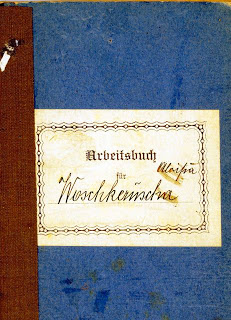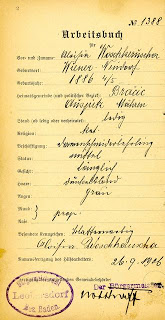Today, May 4, 2011, marks the 125th birthday of my maternal grandmother, Alöisia nee Woschkeruscha (VAUSH-ker-UZSH-uh). Luisa was born in 1886, in the town of Wiener-Neudorf, not far from Vienna, Austria. She was baptized four days later on May 8th. Death was so common for infants, parents wanted to be sure they were baptized as soon as possible to assure them their place in heaven.
I first wrote about Luisa in a Carnival of Genealogy blog for Women’s History Month (see Dressmaker Extraordinaire).
In that post we learned that Luisa (as she was called, and later, Louise, in America) had smallpox as a child, which disfigured her face and made her feel she was ugly. In fact, some of her own identification papers reinforced the idea that she was “scarred.”
I don’t have anywhere near the amount of documentation and letters from my mother’s side of the family as from the Gartz side, but I do have Luisa’s Arbeitsbuch, (literally a work-book) a common document of the era in which a person’s place of employment is noted, along with employer, and in this one, a complete description of the worker, my grandmother, Luisa
We can learn a lot about Luisa’s appearance from the first page of this book, and the way a simple piece of identification can serve to undermine a young woman’s self- esteem.
Along with her name, place of birth, birthdate and political region (Bracic) the document includes the following information:
Married or single: single
Religion: Catholic
Height: Medium
Face: long
Hair: dark blond
Eyes: grey
Mouth and nose: appropriate
Dated: September 26, 1906—she was twenty years old.
I can’t help but imagine how embarrassing it must have been to have to present her Arbeitsbuch to potential employers and have themn search her face for the pockmarks so unkindly included in her description.
About seven years after this book was created, Luisa would leave for America. I have one letter she wrote, which reveals a young woman of remarkably good humor and confidence as she makes her way in a new country on her own. Coming up in future posts.
But first I want finish the Travel Tuesday posts about Sam Ebner’s death in World War I and the unexpected connections I discovered between my grandparents in America and the monument built in Romania to honor the fallen.



I can’t wait to hear about the letters. What a shame about the pockmarks, though. My father-in-law has them also and although he jokes about them, I can tell it’s something he’s self conscious about, even in this day and age!
How difficult it must have been for her to feel so scarred. Look forward to hearing about her “good humor!”